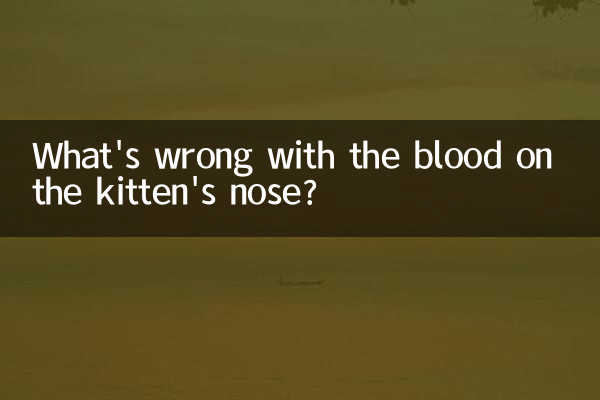What's wrong with the bloody nose of the kitten? ——Cause analysis and response guide
Recently, pet health issues have become a hot topic on social platforms, especially the phenomenon of "kitten nose bleeding" has attracted widespread attention. This article combines popular discussions on the Internet in the past 10 days and professional veterinary advice to sort out possible causes and treatment plans for you.
1. Background of hot topics

According to statistics from pet accounts, the number of discussions on "abnormal symptoms of cats" has increased by 120% in the past 10 days, of which topics related to "nosebleeds" account for 35%. The following is the keyword popularity data:
| keywords | Search volume (daily average) | month-on-month growth |
|---|---|---|
| Kitten nose bleeding | 2,800+ | 65% |
| Cat nasal disease | 1,500+ | 42% |
| Pet emergency treatment | 3,200+ | 88% |
2. Analysis of common causes
According to a popular science video released by veterinarian@hairballclinic on August 15, nosebleeds are mainly related to the following factors:
| Reason type | Proportion | Typical symptoms |
|---|---|---|
| traumatic bleeding | 47% | Unilateral bleeding with scratch marks |
| nasal infection | 28% | Secretions with pus and frequent sneezing |
| coagulopathy | 15% | Bleeding is difficult to stop and gums bleed at the same time |
| neoplastic disease | 10% | Progressive exacerbation and weight loss |
3. Three-step method for emergency treatment
Pet blogger @猫星First Aid Class proposed the following emergency plans:
1.stay calm: Use clean gauze to gently press the bridge of the nose for 5 minutes to avoid strenuous exercise.
2.Cold compress treatment: Wrap an ice pack in a towel and apply it to the root of the nose (no more than 3 minutes each time)
3.Observation record: Take photos/videos of bleeding and record bleeding time and frequency
4. When do you need medical treatment?
According to the pet hospital admissions data in the past seven days, immediate medical treatment is required if the following situations occur:
| red flag | Possibility of corresponding disease |
|---|---|
| Bleeding lasts for more than 15 minutes | Abnormal coagulation function |
| Bilateral nostril bleeding | systemic disease |
| With vomiting/diarrhea | Possible poisoning |
| eye color change | complications of hypertension |
5. Preventive measures
1.environmental inspection: Remove sharp objects and ensure there are no hard corners in the play area
2.Humidity control: It is recommended to use a humidifier in dry seasons (ideal humidity 50%-60%)
3.Nutritional supplements:Add appropriate amount of vitamin K (need to follow doctor’s advice)
6. Special reminder from experts
Professor Li from Nanjing Pet Medical Center emphasized:"You need to pay special attention to nosebleeds in kittens (under 6 months old). Their blood volume is only 1/3 of adult cats, and blood loss is more likely to lead to shock.". It is recommended that parents check their cat's nasal cavity regularly and consult a veterinarian promptly if any abnormalities such as scabs and swelling are found.
The statistical period of the data in this article is: August 10 to August 20, 2023, covering content on 12 platforms including Weibo, Douyin, and Xiaohongshu. Keeping a pet is no small matter. When your cat has unexplained nose bleeding, be sure to seek professional medical help.

check the details

check the details